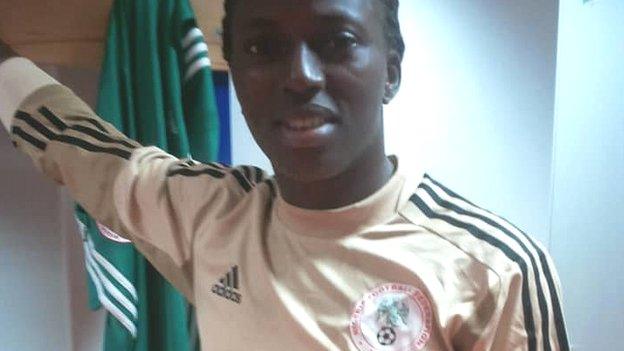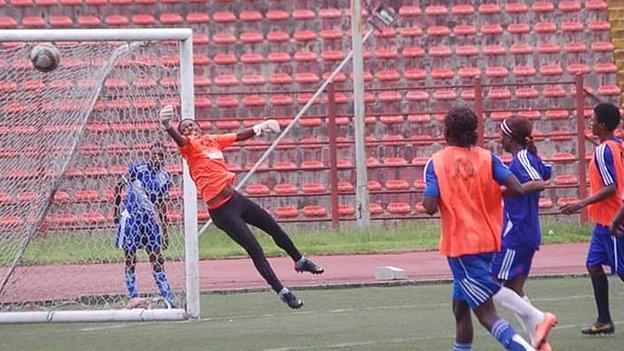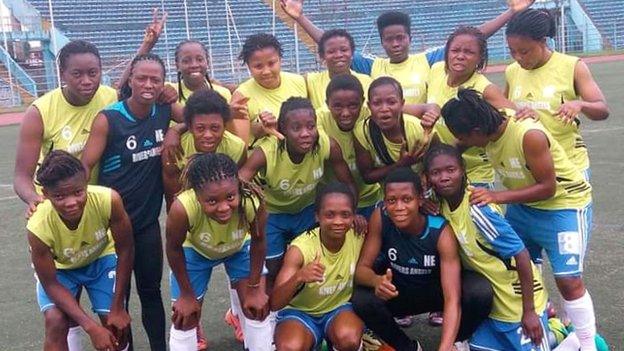Should all Nigerian athletes get health insurance?
- Published

Bidemi Aluko has had to quit football at the age of 26
All Nigerian sports internationals will have their healthcare covered, if a Nigerian politician succeeds in pushing through legislation on the matter.
Ibrahim Olanrewaju has taken up the issue after Bidemi Aluko, who played in goal for Nigeria's national women's football team, struggled to pay for her cancer treatment.
Olanrewaju represents a constituency in Aluko's home state, Ekiti, in Nigeria's House of Representatives.
"These are the sportsmen who are striving every day to promote the image of Nigeria," the MP told BBC Sport Africa.
"When they are giving something to Nigeria, we should be giving them something back."
In July, Olanrewaju managed to persuade the House of Representatives to agree to a motion, external that urged the Ministry of Youths and Sport Development to "provide comprehensive health insurance for all Nigerian footballers under the National Health Insurance Scheme (NHIS)".
Olanrewaju, 45, has since confirmed to the BBC that he would like the ruling to cover all Nigerian internationals, regardless of sport.
Under his proposal, the sports ministry would pay contributions into the insurance scheme and the NHIS would take up the rest of the costs should an individual require treatment.
Aluko, who played for the Super Falcons between 2010-2012, has been reduced to relying on the goodwill of others after selling her possessions to meet the costs of her treatment.
Last week, the Nigeria Football Federation announced it will pay nearly $14,000 (£11,200) towards the 26-year-old's treatment.
The announcement came days after BBC Sport Africa featured Aluko's plight.

Aluko is a former Nigeria Under-20 goalkeeper
Initially diagnosed with breast cancer in April 2017, the former goalkeeper was given the all-clear a year later after undergoing both treatment and a mastectomy.
But this January, the disease returned.
"The doctor recommended that I take 10 doses of treatment - each dose cost $1,305 and I am going to take 10 of them," Aluko told BBC Sport.
"I have sold everything I have since I was diagnosed - all that I have worked for."
With her career over due to her diagnosis, Aluko - who also played for Nigeria's Under-20 team - can no longer afford the urgent treatment she requires.
In July, the House of Representatives, Nigeria's lower house of parliament, also agreed to urge the ministry of health "to urgently undertake a holistic assessment" of Aluko's condition in order to provide her with health care.
But progress has been slow because the Nigerian parliament went on its recess shortly afterwards - and is only set to resume later this month. The committees set to look into the matter at both the health and sports ministries have yet to be formed.
Until the Nigerian government adopts the policy, Aluko is relying on handouts - some from the Nigerian players' union, some from former players.

Aluko (back row, second from left) was recently playing her club football for Nigeria's River Angels
When the current crop of Super Falcons heard about her case during the Women's World Cup in France, the players contributed $4,000 to her treatment.
"The members of the Super Falcons have really done well. I never expected it," Aluko said.
''Football was my passion. I love playing football. I don't think I can play football professionally again. All I need now is to get my life back again.''
The politician Olanrewaju is determined that the proposal for the government to pay for the healthcare of the country's former international sports people becomes law.
"I am very confident," he said. "We have to act now because if we save this soul, you save thousands of souls. I have the ball at my feet - I must now score the goal."
Additional reporting by Piers Edwards.